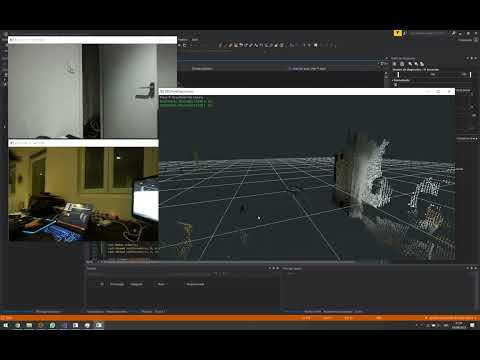OK. For an unknown reason, if I compute each zed camera on its own thread, parallele mapping works … a little.
Here my code :
///////////////////////////////////////////////////////////////////////////
//
// Copyright (c) 2022, STEREOLABS.
//
// All rights reserved.
//
// THIS SOFTWARE IS PROVIDED BY THE COPYRIGHT HOLDERS AND CONTRIBUTORS
// "AS IS" AND ANY EXPRESS OR IMPLIED WARRANTIES, INCLUDING, BUT NOT
// LIMITED TO, THE IMPLIED WARRANTIES OF MERCHANTABILITY AND FITNESS FOR
// A PARTICULAR PURPOSE ARE DISCLAIMED. IN NO EVENT SHALL THE COPYRIGHT
// OWNER OR CONTRIBUTORS BE LIABLE FOR ANY DIRECT, INDIRECT, INCIDENTAL,
// SPECIAL, EXEMPLARY, OR CONSEQUENTIAL DAMAGES (INCLUDING, BUT NOT
// LIMITED TO, PROCUREMENT OF SUBSTITUTE GOODS OR SERVICES; LOSS OF USE,
// DATA, OR PROFITS; OR BUSINESS INTERRUPTION) HOWEVER CAUSED AND ON ANY
// THEORY OF LIABILITY, WHETHER IN CONTRACT, STRICT LIABILITY, OR TORT
// (INCLUDING NEGLIGENCE OR OTHERWISE) ARISING IN ANY WAY OUT OF THE USE
// OF THIS SOFTWARE, EVEN IF ADVISED OF THE POSSIBILITY OF SUCH DAMAGE.
//
///////////////////////////////////////////////////////////////////////////
/**********************************************************************************
** This sample demonstrates how to capture a live 3D reconstruction of a scene **
** as a fused point cloud and display the result in an OpenGL window. **
**********************************************************************************/
#include <sl/Camera.hpp>
#include <opencv2/opencv.hpp>
#include "GLViewer.hpp"
bool _enableMapping = true;
bool _running = true;
void run(int index, std::mutex &mutex, GLViewer &viewer, sl::FusedPointCloud &map, sl::Transform tf) {
sl::Camera zed;
// Set configuration parameters for the ZED
sl::InitParameters init_parameters;
init_parameters.depth_mode = sl::DEPTH_MODE::PERFORMANCE;
init_parameters.coordinate_system = sl::COORDINATE_SYSTEM::RIGHT_HANDED_Y_UP; // OpenGL's coordinate system is right_handed
init_parameters.coordinate_units = sl::UNIT::MILLIMETER;
init_parameters.camera_resolution = sl::RESOLUTION::HD720;
//init_parameters.camera_fps = 60;
init_parameters.depth_minimum_distance = 200;
init_parameters.sdk_verbose = true;
// Open the camera
init_parameters.input.setFromCameraID(index);
zed.open(init_parameters);
// Setup and start positional tracking
sl::PositionalTrackingParameters positional_tracking_parameters;
positional_tracking_parameters.enable_area_memory = true;
positional_tracking_parameters.enable_imu_fusion = true;
positional_tracking_parameters.initial_world_transform = tf;
zed.enablePositionalTracking(positional_tracking_parameters);
if (_enableMapping) {
// Set spatial mapping parameters
sl::SpatialMappingParameters spatial_mapping_parameters;
// Request a Point Cloud
spatial_mapping_parameters.map_type = sl::SpatialMappingParameters::SPATIAL_MAP_TYPE::FUSED_POINT_CLOUD;
// Set mapping range, it will set the resolution accordingly (a higher range, a lower resolution)
spatial_mapping_parameters.set(sl::SpatialMappingParameters::MAPPING_RANGE::LONG);
spatial_mapping_parameters.set(sl::SpatialMappingParameters::MAPPING_RESOLUTION::HIGH);
// Request partial updates only (only the latest updated chunks need to be re-draw)
spatial_mapping_parameters.use_chunk_only = true;
// Start the spatial mapping
zed.enableSpatialMapping(spatial_mapping_parameters);
}
std::chrono::high_resolution_clock::time_point ts_last;
// Setup runtime parameters
sl::RuntimeParameters runtime_parameters;
runtime_parameters.confidence_threshold = 50;
auto camera_infos = zed.getCameraInformation();
auto resolution = camera_infos.camera_configuration.resolution;
// Define display resolution and check that it fit at least the image resolution
sl::Resolution display_resolution(std::min((int)resolution.width, 720), std::min((int)resolution.height, 404));
// Create a Mat to contain the left image and its opencv ref
sl::Mat image_zed(display_resolution, sl::MAT_TYPE::U8_C4);
cv::Mat image_zed_ocv(image_zed.getHeight(), image_zed.getWidth(), CV_8UC4, image_zed.getPtr<sl::uchar1>(sl::MEM::CPU));
std::cout << "Camera " << index << " Type:" << camera_infos.camera_model << " SN:" << camera_infos.serial_number << std::endl;
while (_running) {
if (zed.grab(runtime_parameters) == sl::ERROR_CODE::SUCCESS) {
// Retrieve the left image
zed.retrieveImage(image_zed, sl::VIEW::LEFT, sl::MEM::CPU, display_resolution);
// Retrieve the camera pose data
sl::Pose pose;
auto tracking_state = zed.getPosition(pose);
viewer.updatePose(index, pose, tracking_state);
if (_enableMapping && tracking_state == sl::POSITIONAL_TRACKING_STATE::OK) {
auto duration = std::chrono::duration_cast<std::chrono::milliseconds>(std::chrono::high_resolution_clock::now() - ts_last).count();
/*
mutex.lock();
zed.extractWholeSpatialMap(map);
viewer.updateChunks();
mutex.unlock();
*/
// Ask for a fused point cloud update if 100ms have elapsed since last request
if ((duration > 0) && viewer.chunksUpdated()) {
// Ask for a point cloud refresh
zed.requestSpatialMapAsync();
ts_last = std::chrono::high_resolution_clock::now();
}
// If the point cloud is ready to be retrieved
if (zed.getSpatialMapRequestStatusAsync() == sl::ERROR_CODE::SUCCESS && viewer.chunksUpdated() && mutex.try_lock()) {
zed.retrieveSpatialMapAsync(map);
viewer.updateChunks();
mutex.unlock();
}
}
cv::imshow("ZED View : " + std::to_string(index) + " : " + std::to_string(camera_infos.serial_number), image_zed_ocv);
}
cv::waitKey(10);
}
image_zed.free();
zed.close();
}
int main(int argc, char **argv)
{
// Initialize point cloud viewer
sl::FusedPointCloud map;
// Point cloud viewer
GLViewer viewer;
viewer.init(argc, argv, &map, sl::MODEL::ZED2i);
std::mutex zedmutex;
std::thread zed1thread(run, 0, std::ref(zedmutex), std::ref(viewer), std::ref(map), sl::Transform(sl::Rotation(), sl::Translation(0, 0, -75)));
std::thread zed2thread(run, 1, std::ref(zedmutex), std::ref(viewer), std::ref(map), sl::Transform(sl::Rotation(M_PI, sl::Translation(0, 1, 0)), sl::Translation(0, 0, 75)));
while (viewer.isAvailable())
sl::sleep_ms(1);
_running = false;
if (zed1thread.joinable()) zed1thread.join();
if (zed2thread.joinable()) zed2thread.join();
// Save generated point cloud
//map.save("MyFusedPointCloud");
return 0;
}
It seems the sl::FusedPointCloud does not support very well multiple retrieveSpatialMapAsync() (or extractWholeSpatialMap()) from different cameras because the updated chunks are corrupted as you can see on the following video :
